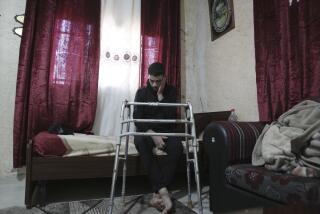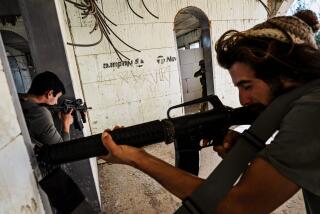3 Palestinians Testify to More Than One Source of Gunfire at Mosque : Israel: Witnesses challenge government claim that lone Jewish settler carried out massacre in Hebron.
- Share via
JERUSALEM — Three Palestinian worshipers who survived last month’s massacre at the Cave of the Patriarchs in Hebron testified Tuesday that there was more than one source of the hail of bullets that killed about 30 Muslims as they knelt in prayer inside the sacred shrine.
The testimony from the first Palestinian witnesses who agreed to appear before an Israeli judicial inquiry commission investigating the brutal slaughter challenged the Israeli government’s assertion that the shooting was the act of a single Jewish settler gone mad.
It also appeared to bolster suspicions that a second gunman was involved in what many Palestinians believe was a broader conspiracy among extremist Jews to use the Feb. 25 attack to derail the Middle East peace process.
The negotiations were suspended after the massacre, the bloodiest single attack by Jewish extremists on Palestinians in the occupied territories since Israel seized the lands in 1967.
In recounting the moments of horror, Yasser Mahmud Youssef Jamal said he heard a Jewish settler enter the mosque and shout in Hebrew at almost the moment the Muslims’ pre-dawn Friday prayers began.
Later, he stated, other survivors translated for him the last words from Baruch Goldstein, the Brooklyn-born settler beaten to death after the attack, just seconds before the Jewish doctor opened fire. “He said, ‘It’s all over for you!’ ”
Then, as more than 100 rounds of automatic weapon fire poured into the prayer hall, Jamal, a 20-year-old laborer from Hebron who watched as his 8-year-old brother, who was beside him, was shot in the head, said he was certain the gunfire came from at least two directions.
“I heard shooting from both directions,” he told the five-member panel, a formal judicial body with full criminal powers that includes a highly respected Arab judge. When pressed by two of the commission members, Jamal said he did not actually see a second gunman but that he was certain the sounds were not an echo or ricocheting bullets.
The second Palestinian survivor to testify, Abdel-Hafez Jaabari, also said he never saw a second gunman but stated, “The shooting was coming from three directions.” He added that he heard explosions inside the hall in addition to the gunfire.
Mohammed Musbah Jabaari, the third Palestinian witness, agreed with most of Jamal’s and Abdel Hafez Jaabari’s versions, adding that he was certain there was a second gunman because he heard shooting while he watched Goldstein reload his weapon.
“Before he put in another clip, there was shooting, the sound of shooting in the hall,” Jabaari said, adding that he too heard explosions that he identified as grenades as soon as the mosque’s imam began the prayers.
“As soon as I knelt down, I heard two explosions, one after the other, and immediately following there was automatic weapon fire,” he said. “The shooting continued for about two or three minutes continuously. . . . The gunfire stopped and started and again stopped and started. The third time the shooting started, I reached the door of the mosque. I saw three soldiers looking over at the shooter, who was standing in the corner.”
Earlier testimony from several of those Israeli soldiers on the scene, who stated that they were under standing orders not to use force against Jews firing at Arabs, also tended to support the theory of a second gunman. They stated that they saw Goldstein carrying an American-made M-16 rifle when he entered the shrine and that a second Jewish settler followed him carrying a Glilon, a compact Israeli-made weapon.
But the commission members appeared highly skeptical of the three Palestinians’ accounts. They spent much of the daylong testimony questioning them on why they made no mention of the additional sources of gunfire in their initial reports Feb. 26 to Israeli police, who handled the investigation into the massacre before the commission was created to conduct an independent inquiry.
The three witnesses replied by stating either that they said nothing about it because the police never asked them or by saying they had reported the additional gunfire but that their statements apparently were misunderstood.
Despite the contradictions, most observers following the inquiry said the mere fact that the survivors testified was significant. Until Tuesday, Palestinian witnesses called before the commission had refused to testify--among them members of the Islamic body that oversees the shrine--asserting that the entire inquiry is biased.
More to Read
Sign up for Essential California
The most important California stories and recommendations in your inbox every morning.
You may occasionally receive promotional content from the Los Angeles Times.













